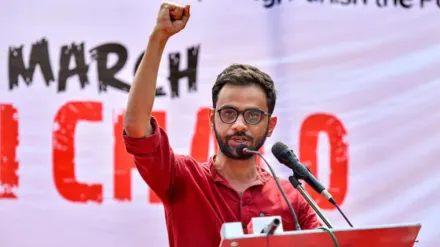New Delhi: Umar Khalid, former JNU student leader and incarcerated activist, has penned a deeply reflective note from Delhi’s Tihar Jail, marking nearly five years since his arrest under the Unlawful Activities (Prevention) Act (UAPA). Drawing inspiration from Fyodor Dostoevsky’s The House of the Dead, Khalid offers a raw account of life in prison, wrestling with the complex emotions of despair, patience, and the ever-fragile thread of hope, reported the Quint.
Dostoevsky’s writings, based on his own imprisonment in Tsarist Russia, resonated profoundly with Khalid, who described the uncanny similarities between 19th-century Siberian prisons and present-day Tihar. “We are not alive though we are living and we are not in our graves though we are dead,” he quoted from the book, echoing his own experience of what he calls “the graveyard of the living.”
Khalid, who was granted a short interim bail last December, noted how those brief seven days of freedom underscored the surrealness of prison life. He confessed that while patience is often learned in prison, he doubts it will remain with him once he is outside.
He explained how hope becomes both a lifeline and a torment in confinement. Reflecting on Dostoevsky’s insight that every convict dreams of freedom, Khalid admitted he no longer sees himself as an optimist. “The higher you hope, the higher is the height from which you come crashing down,” he wrote. Yet, he observed that most inmates remain “insanely hopeful,” even in the direst circumstances.
Khalid recounted the remarkable story of a fellow inmate sentenced to life without parole, spared from the death penalty by a Presidential pardon. For nearly 30 years, the man had lived a routine, isolated life in jail. But despite his fate, he never gave up on hope. After years of legal effort, he finally secured a 21-day furlough — his first glimpse of the outside world in nearly three decades.
Upon his return, the man described the 21 days as feeling like 21 minutes. Many of his family members had passed away; others were strangers. Yet he returned voluntarily, believing that regular furloughs might eventually lead to release.
Khalid reflected on how such hope — seemingly irrational — is what keeps many prisoners going. Even the system, through mechanisms like furlough, recognizes the need to nurture this fragile hope for eventual reintegration into society.
In closing, Khalid wrote: “Five years have passed. Half a decade. That’s time enough for people to complete their PhDs, fall in love, have children, and for the world to normalize genocide in Gaza. Is it time enough for our release?”
Umar Khalid was arrested in 2020 for his alleged role in the Delhi riots conspiracy. He remains in jail without trial. His letter serves as a poignant reminder of the human cost of prolonged incarceration and the quiet resistance of those who continue to hope behind bars.




